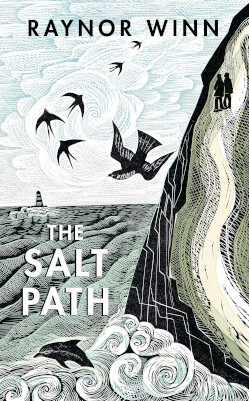The salty path of veracity
Tis the season for publishing debacles, apparently. Just a few weeks ago the story broke that a list of great books for summer reading, published by major newspapers, contained books that didn’t actually exist. The writer had used AI to do the research, and it had made things up.
This week, the author of a publishing sensation, The Salt Path, had her success blow up in her face when a British newspaper, The Observer, a British newspaper, wrote an expose of alleged untruths in Raynor Winn’s memoir/tale of hope.
What the heck happened?
A memoir is defined as a narrative, written from the perspective of the author’s personal memories, about an important part of their life. “The assertions made in the work are thus understood to be factual.” (Wikipedia, subject: Memoir)
In the writing/publishing world, it’s understood that the story is seen through the lens of the author’s memory, and of course none of us (except Sheldon Cooper on The Big Bang Theory) can recall our lives in perfect detail. I’ve had many requests to write a memoir of the adventure- and sometimes chaos-filled travels of my hubby and I, and I wouldn’t be able to supply everything exactly as it happened, even with a pretty good memory. I’d be recounting the highlights, the nuances, the emotions (such as the ‘are you kidding me?’ feeling when learning over dinner the first night of our honeymoon that a hurricane was on the way in two days).
But I would strive for as much truth as I could bring to it. And our story wouldn’t carry any emotionally charged message, beyond that: our world is an amazing place and we learn so much by travelling it, no plans ever run perfectly, and our motto, after a lot of zaniness, would be “Keep Calm and Maintain a Sense of Humour”. (If no one’s ever copyrighted that one, it’s mine now ©)
I haven’t read The Salt Path – in fact, I wasn’t aware of its existence before this new scandal made all the literary news – but it carries a significant message of triumph over unfair adversity, which appeals to all of us. However, according to the substantial research conducted by The Observer, the basic elements of the adversities that drove writer Raynor Winn and her husband Moth to spend months hiking the South West Coast Path of England with no money and whatever they could fit into two small backpacks are patently untrue.
It’s an interesting publishing story. This is what I’ve learned so far:
The book has a visually captivating abstract cover, very atmospheric. The names of the author and her husband are engaging and ‘cool’: Raynor and Moth. (I have to admit that my first reaction was who names their child Moth?)
 The Salt Path. book cover, By Raynor Winn – https://lgslibrary.com/blog/costa-book-awards-2018-shortlists/, Fair use, https://en.wikipedia.org/w/index.php?curid=76756965
The Salt Path. book cover, By Raynor Winn – https://lgslibrary.com/blog/costa-book-awards-2018-shortlists/, Fair use, https://en.wikipedia.org/w/index.php?curid=76756965Raynor writes of losing a beautifully bucolic country house and their livelihood from it, due to a bad investment with a friend. Based on the sampler I read on Amazon, the book is written to elicit a lot of pathos for their plight, with a great deal of detail about the charms of the existence being ripped away from them through no fault of their own.
At the same time, “Moth” receives a devastating diagnosis of a terminal disease, corticobasal degeneration. The standard prognosis is 6 to 8 years, and he’s already lived through 6 of those seeing different doctors. According to Sally, they’re told he must have a slower version.
Feeling they have no other options (Tim has a brother, who apparently won’t help them out), they gather up whatever belongings and camping supplies will fit into light backpacks, as Tim is in poor shape and can’t carry much. Inspired by a book called Five Hundred Mile Walkies, they decide to spend whatever time they have left together living “wild” as they hike the path that circles the coast of Devonshire.
Sally apparently wrote a memoir of the tribulations of homelessness, the triumph of the human spirit and the almost-miraculous restoration of her husband’s health.
Original reviewer blurbs have included:
‘A beautiful, thoughtful, lyrical story of homelessness, human strength and endurance’ Guardian
‘A tale of triumph: of hope over despair; of love over everything’ Sunday Times
‘Mesmerising. It is one of the most uplifting, inspiring books that I’ve ever read’
‘The most inspirational book of this year’ The Times
‘Luminescent. A literary phenomenon’ Mail on Sunday
‘This is what you need right now to muster hope and resilience . . . a beautiful story and a reminder that humans can endure adversity’ Stylist
The memoir has sold over a million copies, and been turned into a movie starring Gillian Anderson and Jason Isaacs as the ‘Winns’. There are photos of the movie stars and the couple sitting picturesquely on grassy hillsides.
Here’s what, according to The Observer’s investigations, actually happened:
The couple’s actual names are Sally and Tim Walker. In the sampler of the book on Amazon, throughout the narrative the couple call each other “Ray” and “Moth”.
From testimony by the actual party involved, Sally and Tim defrauded the friend’s company of about £64,000. They were then given a loan by one of Tim’s relatives, which they failed to repay, and the relative then turned the loan over to two other parties. The case went to court and the Walkers lost the judgment. There’s more to the story, but their property was later seized under those circumstances.
There have also been questions about the truth of Tim’s illness. He was treated for that condition, but according to experts it isn’t following the usual progression and shortened lifespan, and the remarkable recovery couldn’t have happened either.
Readers are by and large furious. Comments online have already convicted Sally, from what I’m seeing, such as:
“…fake memoirs are nothing new. Doesn’t make this latest one any less scummy, though.” (on Redditt)
“They presented themselves as tragic victims of their own generosity, but they actually lost their house because they couldn’t pay back the 60 grand she nicked from her job?” (on Redditt)
“I didn’t like her when I read the book. I couldn’t get over her selfishness and lack of shame for all the petty crimes like not paying for the use of camp site facilities, as if other people’s livelihoods don’t matter…and did she ever go back and pay these debts after she became rich? At the end someone is fooled enough to give them a property too! I feel vindicated now in my opinion of her. What’s a campsite fee to someone who has embezzled £64,000? Not to mention a fake lottery to win their house before it was repossessed!” (comment on a reviewer’s website)
“The Book Promotion Industry is part of the problem.” (on Redditt)
Of course the publishers were heavily romanticizing and promoting The Salt Path. That is their job, after all. As a self-published author I do the same. However, my novels are works of fiction.
Why do authors pen ‘memoirs’ that are bogus? So that they can say they’ve published a book, I assume, and enjoy any resultant fame and profit from it.
In 1997 a book titled Misha: A Mémoire of the Holocaust Years, was written by a woman named Misha Defonseca, who supposedly, as a child whose Jewish parents were taken by the Nazis, fled across Europe on foot and was adopted by a wolf pack. Well, it turned out that her real name is Monique De Wael, she’s not Jewish, and the whole thing was a ‘pack’ of lies. The book was another bestseller made into a movie, but after the truth came out she was ordered to pay $22.5 million back to her publisher. Her comments were that “it’s not the true reality, but it is my reality”, “there are times when I find it difficult to differentiate between reality and my inner world” (no kidding) and that “ever since I can remember, I felt Jewish.”
Memoirs are meant to be inspiring, and readers reasonably feel cheated and betrayed if they find out the story wasn’t genuine. Readers of James Frey’s ostensible drug addiction memoir, A Million Pieces, eventually sued the publisher, Random House, claiming they were defrauded. A settlement was reached in which the publishing house agreed to pay out a total of up to $2.35m.
But how are publishers to forestall publication of these kinds of books?
It seems that memoirs are fact-checked – to a limited extent – with a publisher looking into an author’s background and story. But apparently publishers don’t have dedicated departments for this, and the fact-checking isn’t the main focus of the editing process. The primary concern is that a book doesn’t contain anything that might lead to a law suit (which I would read as ‘libellous’). The author signs a contract with the publisher pledging the integrity of the material to the ‘best of their knowledge and belief’. If problems later arise, the publisher can then cancel the author’s contract, and it’s usually the author’s reputation that sustains damage.
I have to wonder who decided to create the aliases for the author and her husband – was it the author herself, to distance herself from her past, or the publisher to provide a more marketable name? For me, that was a red flag right off the bat. If you’re publishing an inspiring memoir, why do it under an assumed name?
It’s a literary nightmare. The PSPA Charity in the UK related to the disease has chosen to terminate its association with the couple. The publisher, Penguin House, isn’t saying much other than that the publication of ‘Winn’s’ next book is being delayed “to support the author”.
The author has stated that The Observer’s allegations are false and that she’s seeking legal counsel, and the newspaper has issued a rebuttal to that.
So what happens now? I suppose the courts will again decide the “truth”. In the meantime, the author has become wealthy and will continue to earn royalties by anyone else who might be curious enough to buy the scandalized book, or her two subsequent books. Do all the reviewers who raved about the book feel silly? Are the movie’s producers regretful? (I’m guessing not for the last one, but I haven’t seen the stats).
I don’t know how much of The Salt Path is true and how much isn’t, but any future books by the author will certainly come out under a cloud, if at all.
I suppose my take on all of this is that as authors we have a duty to write from the heart, not the pocketbook. I haven’t been able to find out what prompted The Observer to begin an investigation into The Salt Path in the first place, but it’s a good lesson for memoirists: when you expose a turning point in your life to the general public, it should be worth its ‘salt’.



